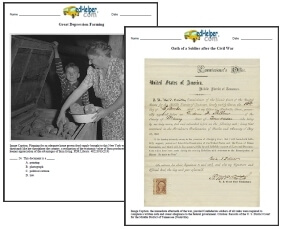
Worksheets and No Prep Teaching Resources
Reading Comprehension Worksheets
Colonial America (1492-1776)

Colonial America (1492-1776)
 Worksheets and No Prep Teaching Resources Reading Comprehension Worksheets Colonial America (1492-1776) |
 Colonial America (1492-1776) |
| edHelper's suggested reading level: | grades 6 to 8 | |
| Flesch-Kincaid grade level: | 7.4 |
|
The Lost Colony
By Sharon Fabian |

|
 1 Roanoke Island is a small island off the coast of North Carolina. There are two interesting stories about the island that date back to the 1500s. One story is English; it has been handed down in American history books. The other story is Croatan; it has been handed down through the generations of Croatan oral history.
1 Roanoke Island is a small island off the coast of North Carolina. There are two interesting stories about the island that date back to the 1500s. One story is English; it has been handed down in American history books. The other story is Croatan; it has been handed down through the generations of Croatan oral history. |
Create Weekly Reading Books
Prepare for an entire week at once! |
| Leave your feedback on The Lost Colony (use this link if you found an error in the story) |
 |
Colonial America (1492-1776)
|
 |
United States
|
|
|
 | Fifty States Theme Unit |
 |
Document Based Activities |